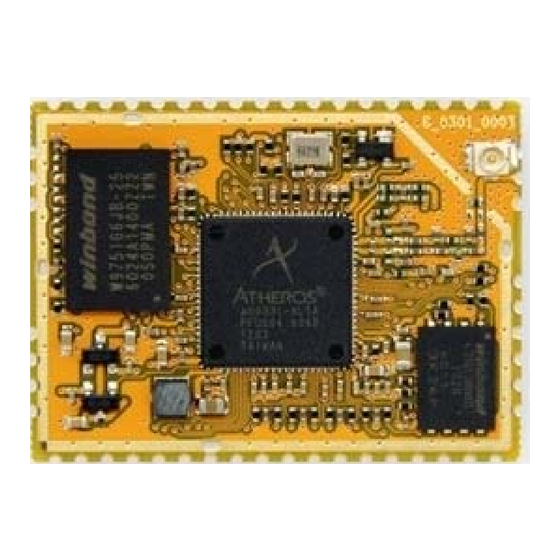
Table of Contents
Advertisement
Quick Links
Advertisement
Table of Contents

Summary of Contents for 8 devices Carambola 2
- Page 1 Carambola 2 manual ...
-
Page 2: Table Of Contents
Table of Contents Introduction ........................ 3 Where to start ........................ 5 Install packages to your PC ............................ 5 Get latest sources ................................ 5 Get older revision ................................ 5 Stable version .................................. 5 More packages ................................... 5 Build image .................................. 6 Connect using serial cable .................... 8 RS‐232 level .................................. 8 TTL 3.3V level.................................. 8 Software .................................... 8 Start terminal ........................ 9 Connection settings ................................. 9 Windows .................................... ... -
Page 3: Introduction
8devices Carambola 2 is a member of Carambola wireless modules family and is based on Qualcomm/Authors AR9331 SoC. Carambola 2 is a surface mountable, single sided, Wi‐Fi enabled Linux module, featuring the lowest power consumption in the industry. Module comes bundled with an open source development board for a quick start of your new Internet of Things era project. 8devices is providing OpenWRT linux distribution source code with necessary patches on GitHub https://github.com/8devices and is supported by our growing community on http://www.8devices.com/community forum. Carambola 2 specification overview AR9331, 400 MHz Memory 16 MB SPI Flash with 64 MB DDR2 RAM Frequency 2.4 GHz Max output power 21 dBm Wireless standard 802.11 bgn Antenna (port) U.FL connector... -
Page 4: Where To Start
Where to start Install packages to your PC sudo apt-get install subversion g++ ncurses-term zlib1g-dev gawk flex patch openssh-server minicom picocom tftp tftpd gettext libncurses5 libncurses5- dev unzip quilt git git-doc git-gui Get latest sources git clone https://github.com/8devices/carambola carambola cd carambola Get older revision For some reason you might wish to get older source revision. To see available tags execute these commands: git tag -l You should see something like this carambola/v1.0 carambola/v1.1 carambola/v1.1-rc1 carambola/v2.0... -
Page 5: Build Image
Build image If you wish you can change kernel settings, but at this time skip this step. make kernel_menuconfig Type make menuconfig You should see configuration window like this: Let's leave everything untouched for now and and exit. Type make for standard building procedure or make -j 2 if you want to use more than 1 thread and you have more than 1 CPU core on your system. - Page 6 if you need or want to see more details. You should see build log like this: Or if you feel really advanced, you can get email notification upon completing build proces. For this you need to install and configure email client.
-
Page 7: Connect Using Serial Cable
Connect using serial cable RS‐232 level It is best to connect to carambola using standard RS-232 male cable. Just plug cable to carambola, set 115200 8N1 settings without hardware flow control and power up your carambola. TTL 3.3V level However, if you have TTL level USB to serial converter, you should do some soldering. Remove J9 and J10 jumpers and connect FTDI 3.3V TTL serial to USB cable. -
Page 8: Start Terminal
Start terminal Connection settings 115200 8N1, no hardware flow control. • Windows I recommend using V-term32 (no need to install just unzip and run) or TeraTerm program. Linux minicom TODO Linux picocom picocom -f n -p n -b 115200 -i -r -l /dev/ttyUSB0 picocom -b 9600 /dev/ttyUSB0 Picocom man •... -
Page 9: Set Up Tftp Server
Set up p TFTP se erver Windo ws You can set up TFTP s server very qu uickly using TFTP32 sofwa are. It is free. Enable T TFTP server. Y Your settings s should look li... -
Page 10: Linux
Linux If you wish, you can use linux machine to do the same task. sudo apt-get install xinetd tftpd tftp sudo touch /etc/xinetd.d/tftp sudo nano /etc/xinetd.d/tftp Paste this code: service tftp { protocol = udp port = 69 socket_type = dgram wait = yes user = nobody server = /usr/sbin/in.tftpd... -
Page 11: Upload New Firmware To Carambola 2
Upload new firmware to Carambola 2 This topic covers few methods how to upgrade firmware on Carambola. Some methods require only serial connection, some only LAN, some LAN and Serial. Also you might need to install/setup other software to perform these tasks. sysupgrade sysupgrade is best ever way to upgrade firmware. -
Page 12: Change Default Configuration
Change default configuration Change Network parameters Edit: carambola/target/linux/ramips/base-files/etc/config/network Cahnge default banner (welcome screen) Change welcome screen example Edit: carambola/package/base-files/files/etc/banner ... - Page 13 Appe If you are ...
- Page 14 FCC Warning Statement: Any Changes or modifications not expressly approved by the party responsible for compliance could void the user's authority to operate the equipment. This device complies with part 15 of the FCC Rules. Operation is subject to the following two conditions: (1) This device may not cause harmful interference, and (2) this device must accept any interference received, including interference that may cause undesired operation.
Need help?
Do you have a question about the Carambola 2 and is the answer not in the manual?
Questions and answers